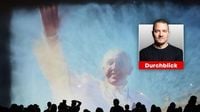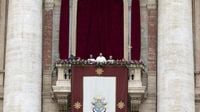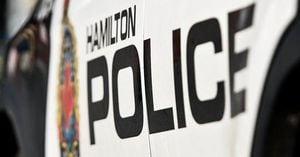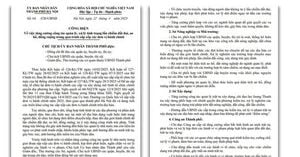In the wake of Pope Francis's passing on Easter Monday, April 21, 2025, the Roman Catholic Church faces an unprecedented leadership void, leaving 1.4 billion Christians without their symbolic leader. At 88 years old, Pope Francis was not only the head of the Roman Catholic Church but also the sovereign of two significant entities: Vatican City and the Holy See, which have far-reaching implications in global affairs.
Urs Brosi, Secretary General of the Roman Catholic Central Conference, pointed out the extensive influence of the papacy, stating, "This network goes far beyond that of a purely religious leader." The Pope's role included seats in UN bodies, meeting with heads of state, and addressing pressing global issues such as migration, environmental concerns, and poverty.
Pope Francis was known for initiating a synodal process aimed at gauging the needs and sentiments of church members, seeking input from the laity rather than just bishops. Brosi noted, "It would have been unthinkable a few decades ago to gather such opinions from regular churchgoers." However, history shows that a progressive pontificate often gives way to a conservative successor, as seen in 1978 when Pope Paul VI was succeeded by John Paul I. This raises the question: will the pendulum swing back toward conservatism with the next pope?
The upcoming papal election, or Conclave, will be critical. Prior to this, a pre-Conclave meeting will occur, allowing eligible cardinals to informally discuss potential candidates, similar to the Swiss Federal Palace's hall of change. Many names are already being circulated, with non-European candidates often showing more restraint on issues like women's rights and homosexuality compared to their European counterparts.
One prominent figure in the conservative camp is Cardinal Robert Sarah from Guinea, who, if elected, would become the first African pope in centuries, although he is not considered progressive for the church. Brosi remarked, "Many voices from Africa are currently very conservative." On the other hand, potential progressive candidates are more likely to emerge from Asia, with Cardinal Luis Antonio Tagle from the Philippines frequently mentioned as a possible successor to Pope Francis. Brosi emphasized the need for a figure like Francis: "Someone who is empathetic, not dogmatic."
However, the chances of either Sarah or a strongly progressive candidate becoming pope are slim since a two-thirds majority is necessary for election. Brosi explained, "This means that no faction can easily push through its preferred candidate alone; compromise figures are essential for consensus." The outcome remains unpredictable due to the complexities involved. Pope Francis appointed numerous new cardinals, many from smaller administrative regions rather than traditional church leaders, which adds an element of uncertainty to the Conclave.
The papacy's significance transcends its religious function. The pope appoints bishops, shapes church law, and serves as a symbolic figure for all of Christianity. Even Protestant churches often feel the impact of his decisions; for instance, in Switzerland, controversial statements from the pope have led to increased membership resignations among Reformed congregations. Brosi noted, "For many people, confessional boundaries are blurring." The pope has become a moral authority on the world stage.
As discussions about the future of the papacy unfold, the political relevance of this role remains a topic of debate. The Vatican, the smallest state in the world, has long claimed a global influence, a sentiment that was evident during Pope Francis's final Easter message, which highlighted conflicts spanning from Yemen to Ukraine. His Easter blessing, delivered with a frail voice, encapsulated the universal aspirations of the papacy, known as "Urbi et Orbi"—to the city and the world.
Yet, the question persists: is this influence merely aspirational, or does it hold real political weight? Regardless of the personality of the pope, papal diplomacy adheres to clear principles: protecting human dignity, fostering international understanding, and safeguarding Christians in various regions.
During his pontificate, Pope Francis directed attention to marginalized communities, a focus reflected in his travels, including a visit to Mongolia, which has a mere 1,300 Catholics. His inaugural trip was to Lampedusa, an Italian island that serves as a waypoint for refugees seeking entry into Europe, illustrating the political challenges of a globalized world.
Pope Francis utilized his moral authority to advocate for peace, justice, and environmental protection, as evidenced by his encyclical "Laudato si," which addressed pressing issues like climate change and social injustice. His successor will likely continue to confront these themes, as they resonate deeply within the church.
However, the Vatican's independent political stance has not been without controversy. Pope Francis's approach to various conflicts, including the Russian invasion of Ukraine and criticism of Israel's actions in Gaza, has drawn scrutiny. Some observers noted a contrast between his personal spontaneity and the Vatican's position as a neutral mediator and peace broker.
The Vatican's unique value in culturally and religiously charged conflicts lies in its ability to promote dialogue among different faiths. As the world grapples with rising nationalism and protectionism, the papacy's call for universal values stands in stark contrast to the actions of global leaders, such as U.S. President Donald Trump, who has distanced himself from international agreements like the WHO and the Paris Climate Accord.
The pope, as a moral authority rooted in universal values, continues to face friction against political and economic interests. Regardless of who assumes the papal mantle next, the ongoing dialogue about the papacy's role in global politics and moral leadership will remain vital.





